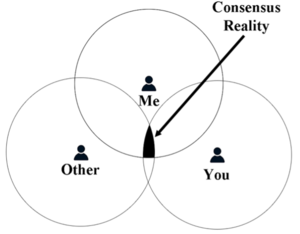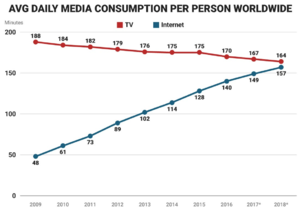Consensus Reality: Difference between revisions
mNo edit summary |
mNo edit summary |
||
| (2 intermediate revisions by the same user not shown) | |||
| Line 1: | Line 1: | ||
[[File:Consensus reality.png|alt=Consensus Reality|thumb|'''Figure 1'''. Consensus Reality would be the common agreed upon reality where subjective perceptions overlap.]] | [[File:Consensus reality.png|alt=Consensus Reality|thumb|'''Figure 1'''. Consensus Reality would be the common agreed upon reality where subjective perceptions overlap.]] | ||
''" | '''''"Consensus reality is the shared illusion of society; it is the social agreement to believe in the same thing at the same time. It is the map, but not the territory."''''' - Tim Leary | ||
'''Consensus reality''' refers to the shared perception of facts and truth among a group—whether that’s a specific community or society as a whole. By surveying collective opinions on key topics, we can map these common agreements (see '''Figure 1'''). Together, they form a framework we call consensus reality: a collective reference point that shapes how a society understands the world. | |||
[[File:Tv.png|alt=Tv|thumb|'''Figure 2.''' Traditional centralised TV viewership has greatly declined vs more algorithmically personalised internet sources. ]]In the pre-internet era, mass media created large, relatively stable consensus realities. Information flowed from a few centralized sources, and most people tuned into the same channels and narratives. But with the rise of the internet and social media, information is now fragmented, decentralized, and often filtered through individual biases (see '''Figure 2'''). As a result, the once-unified cultural lens is splintering into smaller, subjective “[[Reality Tunnel|reality tunnels]]”—distinct worldviews shaped by personal feeds and curated content. | |||
The gatekeepers of knowledge are no longer a few trusted institutions but a chaotic mix of influencers, platforms, and algorithms. What used to be a shared cultural narrative is dissolving into a patchwork of conflicting perspectives. This fragmentation explains everything from the growing political polarization to the friction we feel with people who once seemed just like us. And yet, upheaval often precedes transformation. | |||
In this age of disorientation, '''[[psychedelics]]''' offer a powerful challenge to dominant narratives. They loosen the grip of consensus reality and open space for inner truth, healing, and reimagination. As more people turn to them not just for escape, but for insight, psychedelics are catalyzing a quiet revolution—one grounded in self-inquiry, emotional depth, and renewed curiosity about the nature of reality itself. Like the printing press before them, they have the potential to reshape collective consciousness—and help us co-create a new shared understanding in a time of cultural breakdown. | |||
Latest revision as of 22:55, 29 April 2025
"Consensus reality is the shared illusion of society; it is the social agreement to believe in the same thing at the same time. It is the map, but not the territory." - Tim Leary
Consensus reality refers to the shared perception of facts and truth among a group—whether that’s a specific community or society as a whole. By surveying collective opinions on key topics, we can map these common agreements (see Figure 1). Together, they form a framework we call consensus reality: a collective reference point that shapes how a society understands the world.
In the pre-internet era, mass media created large, relatively stable consensus realities. Information flowed from a few centralized sources, and most people tuned into the same channels and narratives. But with the rise of the internet and social media, information is now fragmented, decentralized, and often filtered through individual biases (see Figure 2). As a result, the once-unified cultural lens is splintering into smaller, subjective “reality tunnels”—distinct worldviews shaped by personal feeds and curated content.
The gatekeepers of knowledge are no longer a few trusted institutions but a chaotic mix of influencers, platforms, and algorithms. What used to be a shared cultural narrative is dissolving into a patchwork of conflicting perspectives. This fragmentation explains everything from the growing political polarization to the friction we feel with people who once seemed just like us. And yet, upheaval often precedes transformation.
In this age of disorientation, psychedelics offer a powerful challenge to dominant narratives. They loosen the grip of consensus reality and open space for inner truth, healing, and reimagination. As more people turn to them not just for escape, but for insight, psychedelics are catalyzing a quiet revolution—one grounded in self-inquiry, emotional depth, and renewed curiosity about the nature of reality itself. Like the printing press before them, they have the potential to reshape collective consciousness—and help us co-create a new shared understanding in a time of cultural breakdown.

